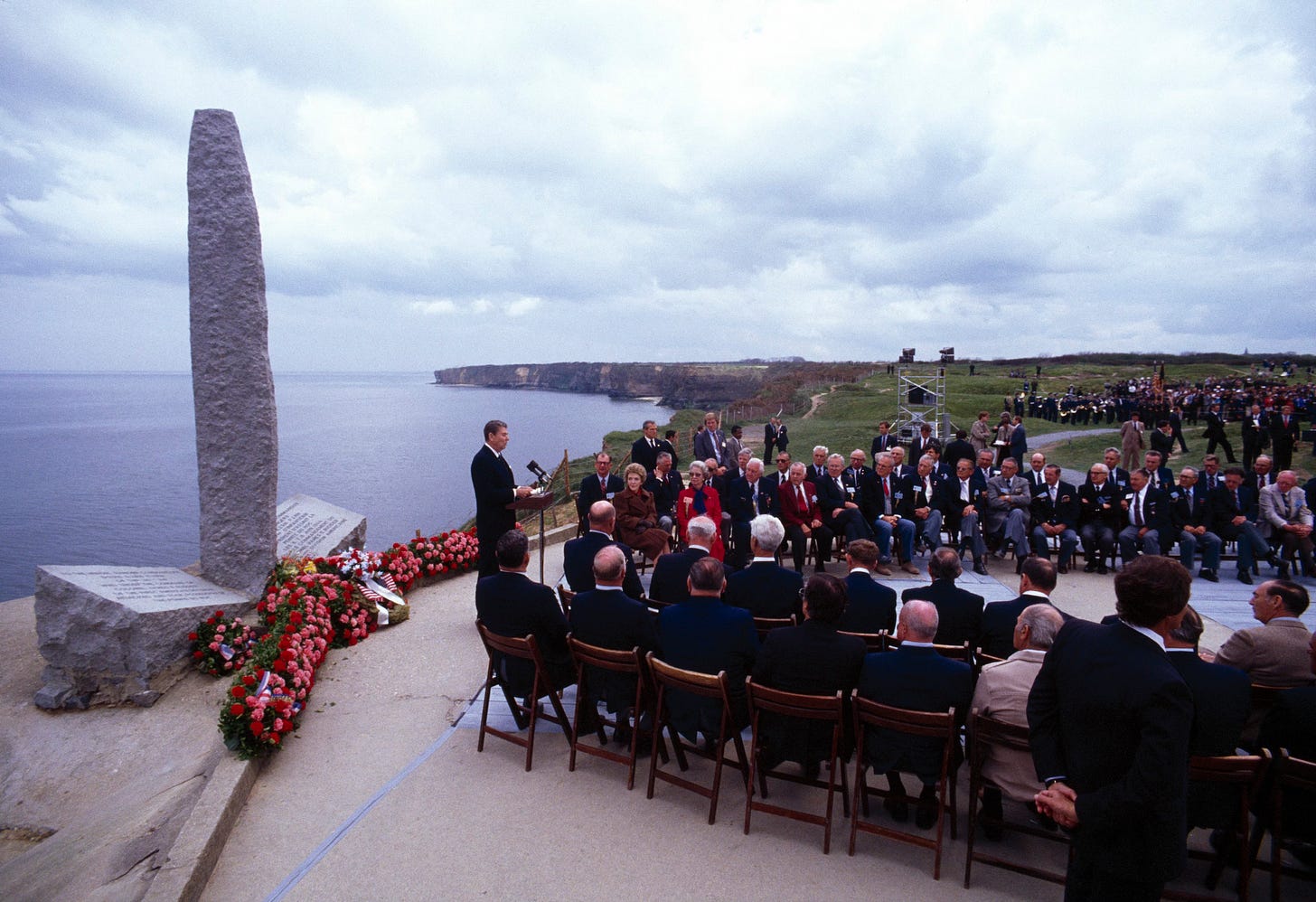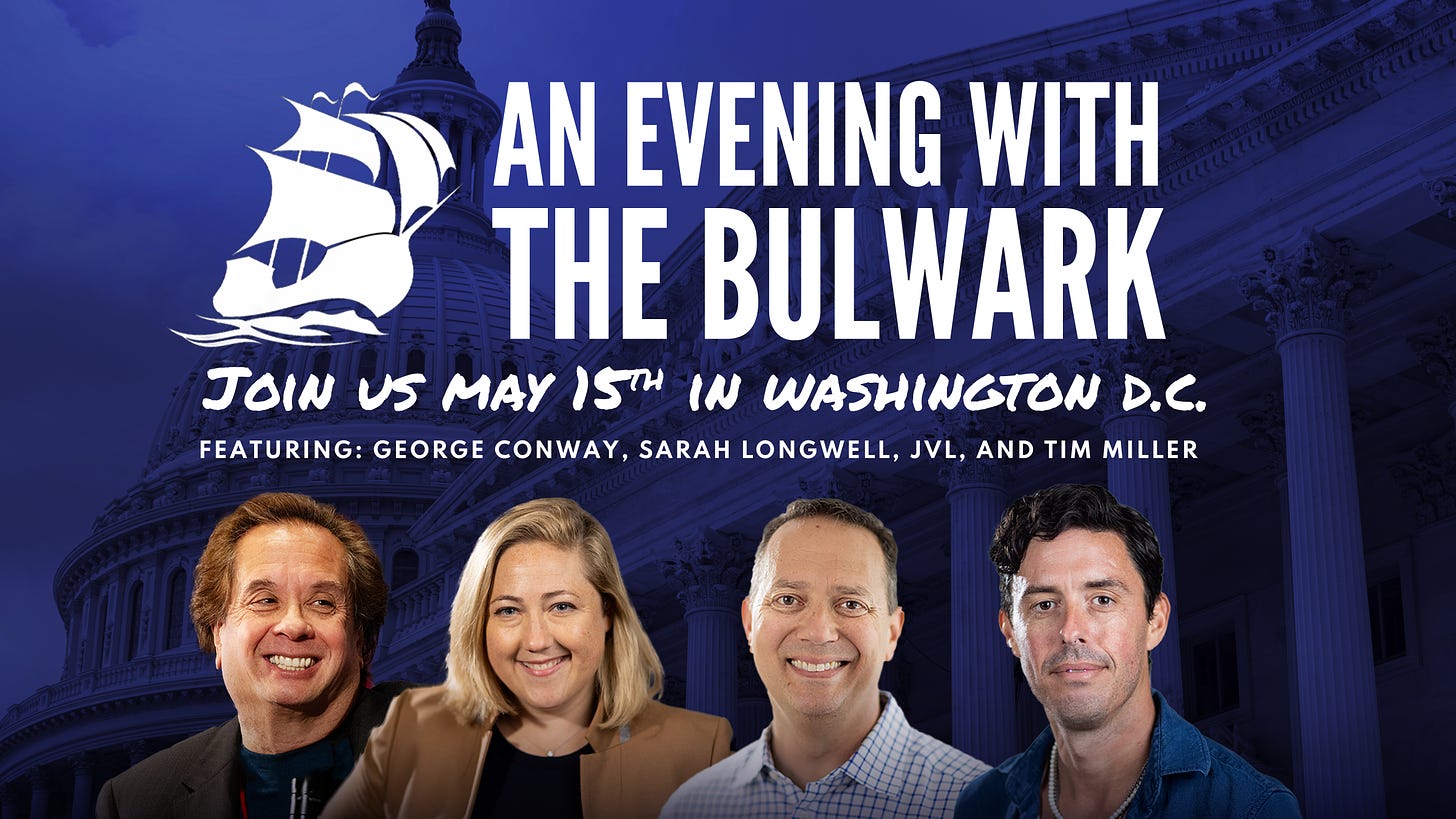The commander of Central Command is in Israel amid fears of an Iranian attack. As American aid to Ukraine stalls, Russian strikes are targeting Ukraine’s power plants. And the head of European Command testified to Congress that the Russian military is regenerating its forces much faster than anticipated. A bunch of House Republicans are taking more time off to visit France for the 80th anniversary of D-Day, but it doesn’t feel like a good moment to take advantage for what our grandparents did, does it? Happy Friday.

The Lessons of D-Day
House Majority Leader Steve Scalise (R.-La.) announced yesterday that the House of Representatives will not be in session on June 6. Members will be going to France for the 80th anniversary of D-Day.
It is fitting and proper that the United States be represented by members of Congress of both parties on that occasion.
But it is also fitting and proper to recall what this anniversary signifies.
It signifies above all, of course, the heroism of the soldiers who fought there. As President Ronald Reagan said at the 40th anniversary commemoration, speaking in the presence of some of those men,
These are the boys of Pointe du Hoc. These are the men who took the cliffs. These are the champions who helped free a continent. These are the heroes who helped end a war.
Gentlemen, I look at you and I think of the words of Stephen Spender’s poem. You are men who in your “lives fought for life . . . and left the vivid air signed with your honor.”
But it’s also worth noting what else D-Day signifies. D-Day vividly brings home the utter and dishonorable failure of the America First movement that was so powerful in American politics before we joined World War II.
As Robert Kagan noted recently in the Washington Post, the America First committee was formed in September 1940—after the fall of France to Hitler, during the assault on Britain—in order to keep the United States out of the European war.
Charles Lindbergh, a key figure in America First, explained that Americans had to respect “the right of an able and virile nation [i.e. Nazi Germany] to expand.”
And, as Kagan explains,
The leading Republican of his day, Ohio Sen. Robert Taft, ridiculed those who expressed fears of advancing fascism. The United States could not be ranging “over the world like a knight errant,” protecting “democracy and ideals of good faith” and tilting, “like Don Quixote, against the windmills of fascism.” The world was “big enough to contain all kinds of different ways of life.”
Accordingly, in February of 1941, an overwhelming majority of Republicans in Congress opposed the Lend-Lease bill to provide aid to Great Britain, still standing virtually alone against the Nazis. In the House, while Democrats voted 238 to 25 in favor of Lend-Lease, only 24 of 159 Republicans supported the legislation. In the Senate, Democrats were in favor 49 to 13, while Republican senators were opposed 17 to 10.
Obviously, once the United States was attacked on December 7, 1941, everything changed.
But today’s America First Republicans, who oppose aid for Ukraine, are following the path their predecessors took before Pearl Harbor.
Those Republicans back then at least had the excuse that they didn’t know what was going to happen in Europe. And of course they didn’t have the lessons of subsequent decades from which to learn.
Today’s America First Republicans have no such excuse.
But perhaps, as they prepare to attend the D-Day ceremonies, it’s not too late for them to learn.
They can begin by reading President Reagan’s whole D-Day speech. In the latter part of his remarks, Reagan goes out his way to address some of the lessons of World War II and what followed.
He praises “the Atlantic alliance—a great alliance that serves to this day as our shield for freedom, for prosperity, and for peace.”
And Reagan continues,
We in America have learned bitter lessons from two World Wars: It is better to be here ready to protect the peace, than to take blind shelter across the sea, rushing to respond only after freedom is lost. We’ve learned that isolationism never was and never will be an acceptable response to tyrannical governments with an expansionist intent . . .
The strength of America’s allies is vital to the United States, and the American security guarantee is essential to the continued freedom of Europe’s democracies. We were with you then; we are with you now. Your hopes are our hopes, and your destiny is our destiny.
Every Republican in Congress should read Reagan’s speech. Now.
Congressional Republicans intend to travel to Normandy to honor the D-Day dead. But that gesture will be hollow—and worse than hollow—if they have failed to act to help the people of Ukraine in their life-and-death struggle.
They are leaving the vivid air signed with their honor. The least we can do is to stand with them.
—William Kristol
Join us at one of these upcoming Bulwark live events!
Catching up . . .
How Trump could best Alvin Bragg and skirt justice (again): Politico
Johnson and Trump to announce coordinated “election integrity” effort: New York Times
FBI director warns of ISIS-inspired attacks in United States: Axios
Russia nationalizes 650,000 acres of Dutch-owned farmland: Yahoo Finance
Biden’s change in tone on Israel is winning back ‘Uncommitted’ voters: Daily Beast
Here’s how Trump gets a fair jury—even in Manhattan: Lawfare
Quick Hits
1. Rep. Chuck Edwards (R-N.C.) on Ukraine
Edwards holds the seat previously held by Madison Cawthorn (“Cauthon”?), whom he defeated in a 2022 primary—and wow, what an improvement.
The Early: Is the anything in particular you’ve heard conflicting reports about that your trip cleared up?
Edwards: I wouldn't say conflicting, but I certainly developed a new sense of urgency for what's taking place over there. Here's the most powerful statement that I heard on the trip: I was standing in the basement — a dark, dank, moldy, smelly basement, not much bigger than the size of this room — and listening to accounts of survivors of having been locked up in that basement for 27 days. People were dying in that room. I stood in the corner where they piled the bodies as people died. They piled nine bodies in that corner in those 27 days.
They told a story where there was a young boy, seven years old, that was dying. And they went upstairs to the door, pounded on it and explained to Russian soldiers that they had a seven-year-old child that was dying. And the response was: “Let him die. This is war.” That’s a cruelty that I don’t believe that anybody in this country is aware of that's taking place.
The Early: What do you see as the path forward now toward sending more aid to Ukraine?
Edwards: I am speaking with our speaker and urging him to get a bill on the floor.
I also learned that there are probably some ways that we can help Ukraine in a fiscally responsible manner rather than just our taxpayers carte blanche paying for the aid. I like the lease-loan program. There’s a great deal of conversation around the advantages of the United States seizing Russian assets and paying for the aid in that manner.
Now, Edwards endorsed Trump on March 5, the day before Nikki Haley suspended her presidential campaign. So clearly his commitment to helping Ukraine and beating Putin isn’t his highest priority.
But maybe his trip there changed his mind. He should consider which position—pro-Ukraine or pro-Trump—is more important to him, because he can’t be both.
2. The Silent Schism in Orthodox Christianity
One of the most under-reported aspects of Russia’s war against Ukraine is the religious component. Orthodox Christianity isn’t familiar to most Americans, but it’s a major world religion and, to radically oversimplify, Putin’s aggression split it in two. Robert F. Worth has the full story at the Atlantic:
The clash of the patriarchs—they have not spoken since [2018]—now looks a lot like a prelude to the Russian war in Ukraine. Just after Bartholomew announced his decision [to grant the Orthodox Church of Ukraine de facto independence from Moscow], Putin convened a meeting of his security council to discuss it. Putin later cited the Church schism as part of his justification for the 2022 invasion, and he and Kirill continue to speak of the breakaway Church as an assault on Russia’s national identity.
But the struggle between Bartholomew and Kirill is bigger than Ukraine. It is a battle for the soul of Orthodox Christianity, a faith with 300 million believers around the world. The divide has drawn comparisons to the Great Schism, which a millennium ago separated the Orthodox East and the Catholic West.
. . .
On one side, Bartholomew has spent three decades trying to make Orthodoxy more compatible with the modern liberal world. He openly urges the faithful to accept evolution and other scientific tenets. He has been a passionate advocate for environmental protection. And, like Pope Francis, he has quietly promoted a more accepting attitude toward homosexuality. But Bartholomew’s power is more limited than the pope’s. There are eight other Orthodox patriarchs, each of whom presides over a national or regional Church, and Bartholomew’s role is that of “first among equals.”
Kirill, who heads by far the largest national Church, has made it into a bastion of militancy.
If you’re looking for a more thorough introduction to the Eastern Church, Timothy Ware’s book is a great place to start. For something a little shorter, check out this 2022 article by Alan Cross.
3. Why does this headline look familiar?
The Wall Street Journal: “New York Times Bosses Seek to Quash Rebellion in the Newsroom.” They might have added: Again.
Over the past several weeks, Charlotte Behrendt, a top Times editor in charge of probing workplace issues in the newsroom, has summoned close to 20 employees for interviews to determine whether staffers leaked confidential information related to Gaza war coverage to another media outlet.
It is the latest internal crisis at the Times, where management has been at odds with factions of the newsroom over union negotiations and coverage of sensitive topics like the transgender community and social justice.
Reporting about the Gaza war has been a particular flashpoint, especially over an in-depth article that found Hamas weaponized sexual violence in the Oct. 7 attacks on Israel. Some staffers questioned the reporting behind it and alleged that the suffering of Gazans isn’t getting the same attention. Times leaders in March said they stand by the reporting.
The internal probe was meant to find out who leaked information related to a planned podcast episode about that article. But its intensity and scope suggests the Times’s leadership, after years of fights with its workforce over a variety of issues involving journalistic integrity, is sending a signal: Enough.
If this were just about the New York Times, it would be an interesting story, but not A1 news. But it’s much larger—this same political-generational conflict is happening at other important American institutions, like the ACLU and, of course, colleges and universities.
In a competition of the young and radical against the old and liberal, is there any way the former don’t win?









Damn, Bill is on fire today. I love it. I hope those cowards on their all-expenses-paid-by-us jaunt to Paris are haunted by a whole bunch of angry ghosts. I'm going to light a candle and ask my deceased WW2 vet grandfather to pay them a visit. That man could lecture the Pope.
"Johnson and Trump to announce coordinated “election integrity” effort"
After which Weinstein and Cosby will announce "combatting misogyny" initiative.